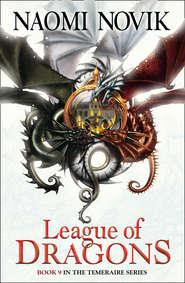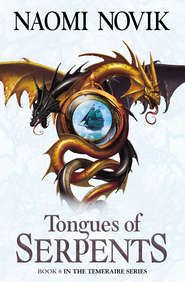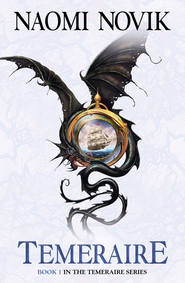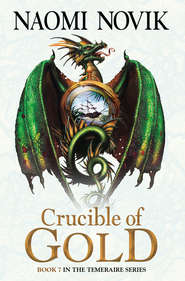По всем вопросам обращайтесь на: info@litportal.ru
(©) 2003-2024.
✖
Blood of Tyrants
Автор
Год написания книги
2019
Настройки чтения
Размер шрифта
Высота строк
Поля
Temeraire struggled his head up to protest: he was not going to drown, at all; he could swim excellently well. And as for leaving Laurence behind—
“You will, too, drown, and then we shall leave him, see if we don’t!” Iskierka said, and bit him sharply. “Get out of the water. What else do you suppose you are doing?”
He tried to hiss at her, but he had to get another breath in to do it, and when he had that one, he got another. By slow measures, she and the others managed to help him heave up onto the line of the shoals, though the rocks crumbled as he clawed at them, and the waves tried to drag him back down. He crouched huddled on the rocks at last and breathed again in slow delicious sips of sea-air, splendid even though his throat ached badly, getting them in. His wings rattled against his back with cold.
“Well done, my dear one; let him have a rest,” he heard Granby saying, faintly, to Iskierka. “We’ll get him aboard as soon as he has filled his air out again.” The Potentate was moving: Temeraire could see it out of one eye, a few sails rigged out on the mizzen, maneuvering away from the rocks. She was listing a little to one side, but not badly. He closed his eyes.
“Idiocy,” he heard Gaiters saying, some indeterminate time after. The sun was beating on his back, now, but it did not seem to warm him. “Emptying your air—what made the lot of you take such a notion into your heads? I should have liked to come back to England with three heavy-weights having drowned themselves not fifty miles from shore; I suppose they would have hanged me and every other surgeon of the party for incompetence. Well, make yourselves of use, now: get him onto the deck at once. We must pack his sides with hot rocks, and fire up the galleys below. D’you think because he’s a dragon he can’t die of pleurisy?”
“I don’t see why you fellows must always be complaining about something new,” Maximus said. “We did get the ship back into the water, didn’t we? And of course Temeraire will not die of a trifling little cold. But you ain’t comfortable where you are,” he added in Temeraire’s ear, “so do let us get you aboard.” His big blunt head came nosing at Temeraire’s shoulder.
Temeraire would have preferred not to move very much, at present; his whole body seemed to ache from tail-tip to nose, and his side and his right foreleg felt especially tender and bruised. He did not quite recall what had happened: the ship had come sliding, and he had not been able to get out of the way—diving was quite impossible, and the rocks were too far away to grab a hold of, for he had been on the lever amidships. But nothing after that, except the water, and the cold, and the green glaze that still seemed to hang faintly over all the world.
“Come on, then,” Iskierka said crossly, above. “I do not see why you must be making such a fuss at a time like this.” She nipped at his hindquarters.
“I am not making a fuss,” Temeraire wanted to say, but his throat ached so. He let them prod him up onto his haunches, and then Maximus and Kulingile put their shoulders beneath his forelegs.
“Just hop aloft, when you are ready,” Maximus said, “and we will go with you, to take some of the weight off: we will see you over to the deck in a trice, see if we do not.”
Temeraire did not feel ready, but Iskierka would keep complaining at him, and nipping, and making cutting remarks; and finally he gathered himself and jumped as best he could. “Oh!” he cried, “Oh,” for he had not been ready, in the least; the pain flaring along his side was like being burnt with a hot poker, to sear a wound after cleaning, but it ran the whole length of his body. His wings snapped tight, and if Kulingile and Maximus had not been beneath him, he should have fallen into the ocean again.
“Ouhff,” Kulingile said with a grunt, and wobbled beneath him as they flew. “No, I am all right,” he said; Temeraire heard it only distantly: everything had gone greenish and hazy again, and he felt very queer and ill indeed. He clung on blindly only, until they sank all three of them to the deck together and Maximus and Kulingile eased him gently down.
The planks were warm beneath him; the ship rocked with the familiar ocean swell. Temeraire put his head slowly beneath his wing, and shut his eyes, and knew no more.
“Enough!” Matsudaira struck the table before him with the flat of his hand.
They had taken Laurence back to Kaneko’s house, and resumed his questioning in the open room off the courtyard, with Lady Arikawa listening in as she devoured the contents of an entire cauldron which had been brought to her smoking-hot and filled with rice, great bowls of beaten egg and fresh fish flung in to cook against the heated sides. The smell was fantastically appealing, enough to make Laurence a little light-headed; the servants had provided a similar meal, on a smaller scale, to Kaneko and Matsudaira, but he had been given nothing.
There had been no chance yet of escape or evasion, but Laurence told himself that at least now he had his bearings, a little. They were on the western coast of Japan—a pity, that; with Nagasaki on the west—and some seven miles as the crow flew from the nearest shore. Laurence worked the map in his mind while they questioned him; it was a refuge from the awareness that they were not likely to give him much future opportunity to put it to use, with a dragon at the door and increased suspicion.
“You persist in telling evident falsehoods,” Matsudaira said. “I will be plain with you: Lord Jinai has told us of the true size of your force. He was attacked by eight dragons of war-like style and of great size. These did not come from England on a boat, and neither did a Celestial. Such a dragon has not been seen across the sea for five centuries, since the servants of the Yuan emperor stole the last egg of the Divine Wind line from Hakozaki Shrine as he withdrew in ignominy from his attempt at conquest, his murderous beasts having slain the rest of that noble line.”
The foreign names slid over Laurence’s mind without purchase, unfamiliar. “A dragon transport is certainly equal to the task of bearing eight beasts; they are designed for twelve,” he said. “As for the particular breed, I am no authority on dragons, and can offer you no explanation but to think your identification mistaken. Dragon-husbandry was not undertaken in my nation before the Norman Conquest, scarce eight hundred years ago; we certainly were not responsible for that theft.”
He spoke dryly; he was beginning to think it not much beyond them to accuse him of such. The magistrate abruptly snapped shut his fan and pointed it at him. “Speak the truth! You are in league with the Chinese!”
Laurence opened his mouth to answer with heated denial, and then halted. The very tongue in his mouth seemed to give him the lie. He could speak Chinese—why? And Japan was not so far off the course for Guangzhou. Perhaps he had come here in league with the Chinese. It was not inconceivable that Britain should have sought an alliance with the mandarins—they were a byword for dragon-breeders, of course; Laurence was sure the Admiralty should have been delighted to purchase some of their beasts as breeding stock.
“Ha,” Matsudaira said, in answer to Laurence’s silence. “Now, Kaneko-san, let us see this Chinese sword, which you have described to me.”
Laurence ruefully watched Junichiro leave the room at Kaneko’s nod, knowing he would soon return with fresh provocation for his interrogators. “Sir,” he said, “perhaps my information is out of date, but so far as I know, you are not at war with China?” Matsudaira looked at him coldly and said nothing, which Laurence took, perhaps with excessive optimism, for confirmation. “Then any friendship between my nation and China can be no concern of yours, if no offense is given you by either.”
“No offense!” Matsudaira said. “Indeed, your brazenness knows no bounds. Permit me to inform you, if you imagine us to be so easily deceived, that I have the honor to be related to the governor at Nagasaki, where three years ago your vessel Phaeton by deceit took hostages and issued threats against the ships of the harbor, and fired upon the city.”
That, Laurence could not conceal, was a blow; he had heard of no such action. The Phaeton—he could only vaguely recall the ship to mind. A frigate? Yes, Minerva-class, and he thought Captain Wood had her, but—
Matsudaira added coldly, watching his face, “That vessel’s dishonorable captain and all his crew repaid their crimes with their lives.” Laurence could not but envision with horror a ruin that might well have been achieved by that monstrous sea-dragon, or another such beast: like a kraken rising from beneath the waves, all unsuspected, to drag the ship down and down, shattered, and spilling the men into the waves to be devoured at its leisure, or by the ocean itself.
He shuddered for it, and for their fate; and more that he knew nothing of it. Three years ago? Could he have lost such a span of memory, and not be wholly mad? Certainly no such event could have escaped his notice—even if the events had gone unreported, he must have heard of the loss of the Phaeton.
“I cannot account for such an assault, sir, save by some grave misunderstanding, or if intended as an action against Dutch shipping in your harbor,” he said, troubled. “They are French allies—”
“More excuses,” Matsudaira said, cutting him off with a slash of the hand, and then Junichiro returned in haste, nearly running, to report the sword missing and launch a new uproar, which Laurence almost welcomed as distraction from the questions he was unable to answer even to himself.
“If I have taken it,” Laurence said, when they demanded its hiding place, “in doing so I have only been taking my own again, and I do not consider I owe you either apology or explanation in such circumstances. Nor could you rationally expect me to hand it back; yet if I should deny having it, you would call it a lie. I must beg to be excused: I have nothing to say upon the subject.”
He had already decided to say as much, if he were questioned. He thought only a thorough and systematic search of the grounds would uncover his bundle: the ground outside had been trampled by too many feet, since his abortive escape the previous night, to show any trace of his actions.
Matsudaira was by no means conciliated by this reply. “We will see what you have to say when you have been more rigorously questioned,” he said angrily. “I will send for a torturer at once—”
Laurence did not flinch, but regarded him with the flat disdain that any such threat merited. “You may question me as you wish,” he said. “I have not lied; and I hope I can answer you and die like an Englishman.”
To his surprise, however, Lady Arikawa raised her head and rumbled, low, making an objection. “I do not think that necessary yet,” she said, a thin translucent ruff around her neck frilling out.
Matsudaira sat up a little further, with rigid shoulders, and said grimly, “I must with the utmost respect disagree, Lady Arikawa.”
Laurence could not argue with the man’s courage, at least, to so incite a dragon to anger; Lady Arikawa might easily have seized and broken him like a toy without even rising to her feet, and by the swift slitting of her eyes seemed tempted to do so.
“You are charged to carry out a full investigation,” Lady Arikawa said. “We have yet no word from Nagasaki regarding any English vessel in the harbor, nor have the Kirin returned from their survey of the coastal waters, near-by. Surely we can wait for this intelligence to reach us before proceeding.”
“The foreigner is certainly condemned by the law, regardless,” Matsudaira said, after a moment. The grey dragon’s wings flared from her back, unsettled, and folded again; the clawed tips shifted back and forth, restlessly.
Sitting beside Matsudaira and sipping tea, Kaneko had shown no expression but level calm all the while; now he said quietly, “My lady, I most deeply regret my error, and—”
“That is enough,” she said, interrupting crisply. “What error can there be in the will of the heavens? Certainly it is only a great service to the bakufu that this barbarian is available to be questioned about these matters; it may be that much benefit to the nation may derive from his rescue. It would be a great impiety upon our part to disregard the means by which the gods have delivered him into our hands, through this vow which caused your eyes to light upon him where he lay in the road. If they did not intend him to be well-treated, they would not have arranged matters so. I cannot agree to a course which despises so clear a sign from the spirit world.”
She delivered these arguments with an air almost of triumph. Laurence thought he detected in them rather more sophistry than true religious fervor. He remained unable to follow all the undercurrents, but he gathered at the least that she wished to spare her vassal Kaneko whatever embarrassment he might suffer at being forced to renege on his vow of assistance. Laurence could only suppose that embarrassment to have consequences more extreme than he imagined.
Matsudaira did not seem persuaded, but at least her vehemence gave him pause; he said more cautiously, trying to answer her in the same lines, “And yet as a magistrate, I must pursue my duty to the law by every means: the gods would not have delivered him in ignorance of so commonplace a fact.”
“The gods would certainly not have expected you to disregard their wishes,” Lady Arikawa returned, with scorn. “Which indeed, they may have meant as a warning. Consider: it is well-known that men of other races are weak. The torture which brings truth from a Japanese may perhaps even slay a Western barbarian, and deprive us of further information.”
Laurence derived some black humor from the burst of indignation he instinctively felt at the nonsense of being any less fitted to endure pain: a fine and absurd thing it would be, to make a case for his own torture. However, the argument was ill-chosen on Lady Arikawa’s part; Matsudaira and Kaneko could not forbear a doubtful glance in his direction. Laurence was a head taller than any other man in the room, and he could have given any of them thirty pounds or more.
Of course, from Lady Arikawa’s perspective—near enough to twelve tons, Laurence would have guessed—the distinction was all much what like. In any event, Laurence closed his mouth on any retort he might have made, and stood wooden beneath their gaze; the weaker and more helpless they chose to think him the better, if they should set a commensurate guard upon him.
“It perhaps would be wise to employ a truly skilled practitioner,” Matsudaira said, after a moment, in a conciliatory manner. “I will send to Edo for a specialist in questioning the sick and the elderly. That will necessitate a certain delay, of course. Perhaps in the intervening time, further intelligence will render the questioning unnecessary, or the foreigner may think better of his lies and confess freely.”
Lady Arikawa inclined her head. “It will be convenient for you to keep charge of him here at Kaneko’s house, in the meantime,” she said—a rather strong hinting, there, and Matsudaira did not attempt to argue with her, but bowed his head in agreement.
Two guards were called in: Matsudaira’s men, Laurence thought; they wore signs of authority matching his own. They escorted him, but only back to his original chamber; and there was a tray of food set on a low table in the middle of the floor. Laurence did not hesitate to devour it, and then lay himself down on the straw mat to consider and to rest.
He roused from a half-sleep a little while later; there were voices, coming faint but audible through the walls, and speaking Chinese: Lady Arikawa, and Kaneko with her. “There can be no more honorable fate than to die in the service of Japan, even for a barbarian,” she was saying, in an anxious tone, low: Laurence could only surmise she preferred not to be overheard by the servants of the house. “Surely in delivering him to such an end, you will have assisted him?”
Kaneko did not immediately answer her, but then said, gently, “Most honorable lady, I regret to disappoint you. I vowed that whomever I found upon the road requiring assistance, whether a beggar or a digger of graves, I would serve him as I would my own grandfather, with honor. To see him dispatched as a low criminal—” He trailed off, and said no more.
“Oh!” Lady Arikawa said eagerly, “but that need not be so! I will speak with the magistrate. Why should he not be permitted seppuku instead? And then indeed you will have served him.”











